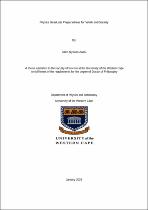| dc.description.abstract | Both internationally and in South Africa, there have been renewed debates about the purposes of higher education and the attributes that should be developed in graduates. In the field of physics, many studies have reported that the preparation of physics graduates in the 21st century needs to be broader, to prepare graduates for a range of careers and roles in society. This case-study aims to understand the formation of graduate preparedness and the development of graduate attributes in a Physics Department at a South African university.
A framework of physics graduate attributes was developed, drawing on skills and attributes benchmarked by several international physics bodies, as well as the South African Institute of Physics; the national SAQA critical cross-field outcomes and the UWC Charter of Graduate Attributes were also drawn on. The study adopted a range of research methods: document analysis of physics module descriptors was used to examine the embeddedness of graduate attributes in the physics curriculum; a questionnaire was developed to gauge students’ perceptions of their preparedness for work and society; focus group discussions with students, and interviews with graduates, were used to understand the structural and institutional arrangements that enabled or hindered the development of physics graduate attributes.
The theoretical framework for this study is the capability approach, as developed by Amartya Sen and Martha Nussbaum. It offers an enlarged view of the purposes of higher education beyond the development of human capital; it also enabled an analysis of the structural challenges that students faced, while at the same time foregrounding student agency, and the strengths and resources that students bring to higher education.
The findings revealed that the physics graduate attributes were unevenly and mostly scantily embedded as learning outcomes in the physics module descriptors; attributes least embedded in the curriculum were social and environmental awareness, ethical behaviour, and teamwork.
Analysis of questionnaire and focus group discussion data showed that students felt that more could be done in the Physics programme to explicitly develop a wider set of physics graduate attributes to enhance their sense of graduate preparedness. In particular, the development of ICT skills, communication skills, practical skills and social awareness was found to be lacking.
Concepts from the capability approach, including conversion factors, well-being and agency, were used to understand the ways in which the development of students’ graduate preparedness and their attainment of academic success and well-being were enabled or hindered by various structural and institutional factors. | en_US |

